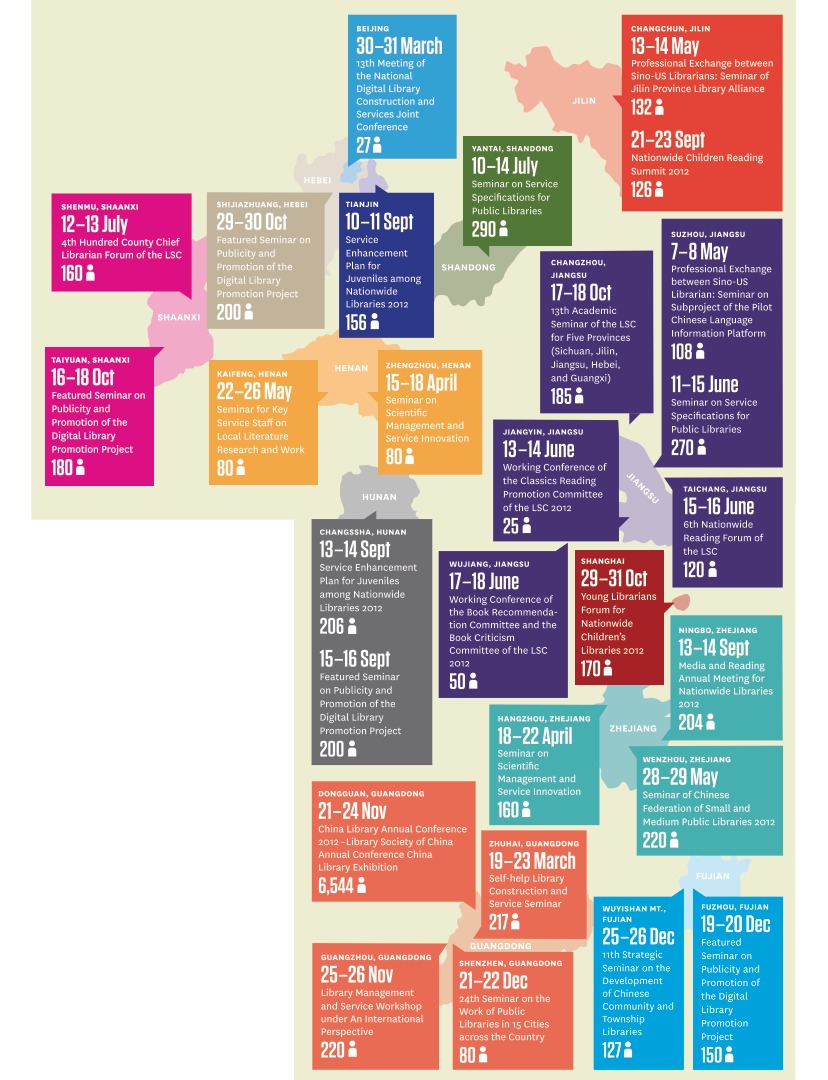Improving the Services of the Library Society of China: Overview of Its Work in 2012
The Library Society of China has been encouraging academic exchange, organising seminars and training courses for librarians throughout China in their push for better library services.

The Library Society of China (LSC) is the largest academic civil society group in the Chinese library community. It falls under the guidance of the China Association for Science and Technology in service operation and is subordinate to the China National Library in administration. It is registered with the China Ministry of Civil Affairs and won a 4A qualification evaluation rating in 2012. In recent years, led by its council and through the promotion of academic exchange and library services, the LSC has made considerable progress in enhancing its servicing capabilities.
Promotion of Academic Exchange
The LSC held 28 academic activities of varying themes in 2012 with 10,687 participants. One such example is the Library Society of China Annual Conference 2012. “China Library Annual Conference 2012 – the Library Society of China Annual Conference · China Library Exhibition” was successfully held in Dongguan, Guangdong province, with the theme “Toward a Strong Cultural Nation – the Responsibilities and Mission of Libraries”. This annual conference collected 1,617 papers – 35 percent more than the year before. It was also the first year that the conference held four themed forums. A total of 27 parallel sessions were held in an effort to subdivide research and exchange directions and as a result of a proactive planning and bidding process. The LSC was, for the first time, specifically entrusted with the function to issue and release information relating to the library sector and relevant businesses. Some 1,691 delegates attended the academic conference and 6,544 took part in the themed forums, parallel sessions and information release meetings.
To provide guidance for the development of grassroot libraries, the 4th Hundred-County Chief Librarian Forum of the LSC was held from July 12 to 13 in Shenmu County Library of Shaanxi province. With the theme of “Construction and Service Innovation of County Libraries in a Free Public Service Setting”, over 150 chief librarians from grassroot public libraries nationwide took part in the forum and shared case studies and experiences of free public service innovation from their respective jurisdictions. After discussion and putting matters to a vote, a consensus, called the Shenmu Consensus, of the 4th LSC Hundred-County Chief Librarian Forum was made.
Conducting Sectorial Coordination and Services
The LSC mobilised the library community to conduct research and decision consultation over relevant laws and regulations. Part of the results of this work were the “Opinions over Law of the People’s Republic of China on Public Libraries” that was submitted to the Law Office of the State Council for approval and the “Opinions over the Copyright Law of the People’s Republic of China” that was submitted to the Ministry of Culture.
The service specifications for public libraries, approved for release by the State Administration for Quality Supervision, Inspection and Quarantine and the National Standardisation Administrative Committee, were formally implemented in May 2012. The National Technical Committee for Library Standardisation is the focal point of these specifications. To ensure that the library community would have a timely understanding of these specifications, the LSC held workshops on the service specifications for public libraries in Suzhou and Yantai in mid-June and mid-July respectively, where 560 representatives from libraries across the nation received training.
The LSC also successfully conducted three sessions of training and seminars for the library community in China. The “Self-Help Library Construction and Service Seminar” held in Zhuhai saw 217 participants; and “Seminars on Scientific Management of Libraries and Service Innovation” held in Zhengzhou and Hangzhou were attended by another 240 representatives of different libraries across the country.
These activities were favourably received by LSC members, and in turn they helped enhance the servicing capabilities of the society itself.

